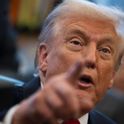If the US prosecution system wasn’t so generally competent. I would advocate referring the US to the international criminal court so that senior figures in the Bush administration could be arrested and tried for crimes against humanity, in particular the use of torture.
But it is competent, although it has been hamstrung by the clever legal footwork of the Bush administration plus the use of the presidential veto—as with the recent veto of legislation that would have required the CIA and all intelligence services to abide by the restrictions contained in the US army field manual on holding and interrogating prisoners.
We all know that the US practices torture against terrorist suspects—waterboarding, or simulated drowning, clearly constitutes torture—and we assume that when a new president is elected, given the clear statements of the remaining three candidates, the practice will stop. What we don’t know is if a new president will have the guts to open the windows in the justice department and allow the fresh air of the rule of law to blow in. If he or she does, unless congress declares an amnesty, then senior figures in the Bush administration will be hauled into court, just as senior figures in the Nixon administration were hauled into court and sent to prison in the wake of the Watergate scandal.
A recent Associated Press story on the decision-making that led to torture being authorised appears to suggest that the net of culpability will be spread wide—embracing not only hardliners such as Dick Cheney and former attorney general John Ashcroft, but more liberal figures including Condoleezza Rice and her predecessor as secretary of state, Colin Powell.
These were the participants in White House meetings that led to the infamous memos of the office of the legal council of the justice department that in 2002 and 2003 laid out the justification for tough interrogation tactics. According to AP, “At times CIA officers would demonstrate some of the tactics to make sure that the principals could understand what they planned to do.” ABC television, covering the same story, quoted Ashcroft as saying at the time, “Why are we talking about this in the White House?… History will not judge this kindly.”
Neither will the US military. Even under Bush, the military has investigated hundreds of service members for abuses in Iraq and Afghanistan. It takes great pride in teaching its soldiers civilised rules of war. Career military commanders and lawyers have consistently opposed the White House lead on reinterpreting the Geneva conventions. Most of them are old enough to remember that it was Ronald Reagan and Margaret Thatcher who led the way in asking their legislatures to ratify the UN convention against torture in 1988. These leaders were not so naive as to think that western civilisation would never face again unscrupulous opponents, but they became convinced, as Steven Ratner eloquently put it in Foreign Policy, that without these legal protections the west would “invite a world of wars in which laws disappear. And the horrors of such wars would far surpass anything the war on terror could deliver.”
What argument could the Bush principals argue in their defence? Do they know how isolated they are? Britain and Spain have had to deal with the trials of those accused of major bombings. The prosecutors have managed to win convictions without abrogating the tough European human rights treaties, which constrain them even more than the Geneva conventions.
Can they even prove torture works? There is no general accounting office report that weighs the results of torture against other forms of intelligence gathering. The most recent investigations of the value of torture have been done in the wake of the so-called battle of Algiers in the 1950s by the many French official torturers who have written memoirs describing what they did. Their conclusion was that the intelligence produced by torture was inferior to work done by informers and other policing activities. According to Darius Rejali in his monumental work Torture and Democracy, “if we go through the entire battle event by event, we find only two instances in which one could say that torture generated true, critically timely information.” General Jacques Massu, the top French commander in Algeria, when asked later if torture was indispensable in wartime, replied, “No, it grieves me. We could have done things differently.”
The French government managed to silence the debate at the time. Today’s America is a much more open society. Let us see, once free of the Bush administration, what it can do to punish those involved in this grievous wrong.
Punish the torturers
April 21, 2008











